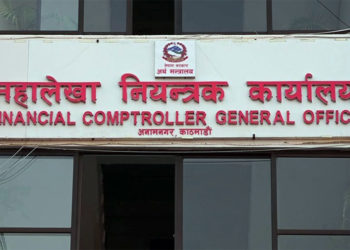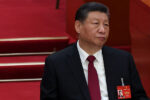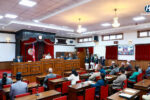KATHMANDU: Economic Digest offers a concise yet comprehensive overview of significant business happenings in Nepal, presented in easily digestible summaries.
The Nepal Stock Exchange (NEPSE) experienced a modest decline of 0.30%, reflecting fluctuations in market activity, despite a total turnover of NPR 8.45 billion.
This drop follows a positive trading day, illustrating the market’s volatility. Gold and silver prices also faced declines due to reduced customs duties, a move by the government that has impacted the precious metals market.
Minister Damodar Bhandari emphasized the importance of private sector cooperation in addressing the nation’s economic challenges, including boosting domestic production and reducing the trade deficit.
In the hospitality sector, the Hotel Association of Nepal (HAN) called for more favorable electricity tariffs and a stable supply for hotels, similar to the manufacturing industry.
The Nepal Tourism Board (NTB) also received approval from the Public Procurement Monitoring Office (PPMO) for its guidelines on managing expenses for international programs, which had been delayed for years, hindering promotional efforts.
Additionally, authorities in Sarlahi seized illegally imported goods, including Chinese garlic and motor parts, highlighting ongoing issues with smuggling and illegal trade.
These updates collectively underscore the challenges and ongoing efforts to stabilize and grow Nepal’s economy.
NEPSE index falls 0.30 percent
The Nepal Stock Exchange (NEPSE) on Thursday dropped by 8.30 points, or 0.30%, today, closing at 2,748.05. This follows a gain of 39.70 points in the previous trading session.
The market opened at 2,757.13 and saw fluctuations throughout the day, with the index dipping to a low of 2,738.80 and peaking at 2,774.14.
Trading activity was active, with a total turnover of NPR 8.45 billion, resulting from the exchange of 16,663,355 shares across 307 companies in 83,128 transactions. Notably, three stocks hit the upper circuit limit during the session.
Gold and silver prices decline amid duty reductions
Gold and silver prices both witnessed a decline on Thursday, with gold dropping by Rs 300 per tola and silver falling by Rs 30 per tola.
The price of gold was traded set at Rs 149,300 per tola, down from Rs 149,600 on Wednesday. This follows a volatile week, with gold having previously fallen by Rs 15,900 on Monday and an additional Rs 2,600 on Tuesday.
Similarly, silver also dropped to Rs 1,800 per tola, reflecting a reduction from Rs 1,830 on the previous day.
This ongoing decrease in precious metal prices comes after the government’s recent move to reduce customs duties, which has significantly impacted the market.
Govt cooperates with private sector: Minister Bhandari
Minister for Industry, Commerce and Supplies Damodar Bhandari has said the government was for cooperating with private sector to forward economic activities.
Minister Bhandari said the problems facing national economy could not be solved without the cooperation of the private sector.
“Capital market should thrive with boost in domestic production and reduction of trade deficit,” he said, adding that introduction of the latest technology would ensure upward trend in economic activities.
According to him, major challenge was to replace imports and increase exports, for which preparations were on to amend various laws related to industry and business.
HAN requests Energy Minister to ensure electricity to hotels
The Hotel Association of Nepal (HAN), an umbrella organization of hoteliers across the country, has demanded smooth supply of electricity to the hotel like that of the industries.
The team led by the HAN President, Binayak Shah, met the Minister of Energy, Water Resources and Irrigation, Deepak Khadka, and demanded that the hotel sector be given facilities of discount on electricity tariff and regular power supply as done to the manufacturing industry.
HAN has requested the Minister to make a necessary policy for running electric stoves in hotels, and providing them time of day (TOD) meters.
PPMO approves NTB’s guidelines for pverseas program expenses
The Public Procurement Monitoring Office (PPMO) has officially approved the long-awaited guidelines from the Nepal Tourism Board (NTB) for managing expenses related to international programs.
After nearly seven years of delays, this approval allows NTB to allocate funds for promotional campaigns abroad.
The “Guidelines on Organizing Programs and Purchasing Abroad,” which were first drafted by NTB in 2017, had been stuck at the PPMO for years, preventing the board from effectively executing international promotional activities, including those planned for the fiscal year 2023/24.
This prolonged delay forced NTB to rely on outdated methods, hampering the impact of its promotional efforts for the past six years.
Goods worth amounting to Rs 8.6 million confiscated
The Sarlahi Police took control a truck and container carrying goods illegally imported via the Bagmatii check post at Karmaiya last evening.
A police squad deputed from the Area Police Office, Karmaiya seized a truck (Province 1-01-001 Kha 4190) with Chinese garlic.
The items exceed the invoice by Rs 2 million 75 thousand 527. Similarly, a container (Na 7 Kha 9465) en route to Birtamode in Jhapa from Birgunj carrying illegally imported motor parts was also impounded, police said.
(Prepared by Srija Khanal)









Comment